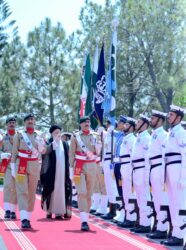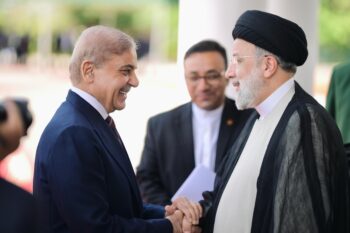Iranian President Ebrahim Raisi and Pakistani Prime Minister Shehbaz Sharif met on Monday in Islamabad to discuss ways to enhance economic cooperation between the neighboring nations. The high-level talks focused on increasing bilateral trade to a staggering $10 billion per year.
In a joint news briefing, both leaders expressed their commitment to strengthening ties and addressing common challenges. Sharif’s office released a statement affirming their agreement to boost the volume of bilateral trade over the next five years. The statement also highlighted cooperation in tackling shared threats, including terrorism.
However, several critical issues remain on the table:
1. Gas Pipeline Stalemate:
Despite the positive tone of the meeting, unresolved issues persist. A gas pipeline project connecting Iran and Pakistan has faced delays, hindering energy cooperation. Both sides must find a way to move forward on this crucial infrastructure project.
2. Smuggling Concerns:
Smuggling from Iran into Pakistan is a well-known problem. The illicit trade of goods, including diesel purchased at Rs22/liter in Iran, poses challenges to both countries’ economies and security.
3. Energy Crisis:
Pakistan grapples with soaring electricity, gas, and petroleum prices. These high costs have rendered Pakistani products less competitive in the international market. The country’s sovereignty is at stake as it struggles to meet its energy demands.
4. Iran’s Role in Pakistan’s Economy:
Analysts believe that Iran holds the key to solving Pakistan’s economic woes. To address this, the Pakistani government should take a bold step and open all trade with Iran using the local currency. Such a move could significantly alleviate Pakistan’s economic challenges.
President Raisi, accompanied by a delegation that included Iran’s foreign minister and cabinet members, will continue his visit by traveling to the eastern city of Lahore and the southern port city of Karachi. However, it’s essential to note that Iran’s Supreme Leader, Ayatollah Ali Khamenei, holds the final authority on state matters, including nuclear policy.
While Raisi’s visit marks a crucial step toward normalizing relations with Islamabad, the complex dynamics of regional politics remain. Prime Minister Sharif praised Iran’s strong stance on the humanitarian situation in Gaza, urging Muslim countries to unite and raise their voices for peace. However, an analyst pointed out that mutual distrust among Muslim nations remains a significant obstacle to unity.
As Pakistan reevaluates its international alliances, the authorities must carefully consider their options. Remaining closely aligned with the USA has led to mounting debts and dictated policies. Perhaps it’s time for Pakistan to mend ties with its neighbors and explore new avenues for economic cooperation and stability.
It is expected that in order to ensure its sovereignty, in the next 10-12 months Pakistan will have an independent foreign policy with strong trade and defense ties with all the neighbors.

